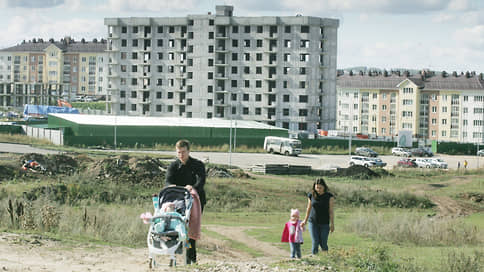Homeless situation – Newspaper Kommersant No. 154 (7355) dated 08/24/2022
[ad_1]

The Supreme Court (SC) of the Russian Federation has separated individual investors from ordinary equity holders, recognizing that they cannot have equal rights in the bankruptcy of the developer. At the same time, the acquisition by a citizen of several apartments is not necessarily considered an investment activity, and the courts are obliged to find out the true purpose of the purchase. Lawyers note that it will not be easy to prove personal consumer goals, and the SC did not explain how to do this. In the market, the share of individual investors is estimated at 10–15%.
On August 23, the Supreme Court published a decision as part of the bankruptcy of Stroyinvest LLC on the complaint of Leonid Panachev, who asked to include in the register of equity holders his demand for the transfer of 15 apartments in the Moscow region, purchased in 2014 for 31 million rubles. under equity agreements. The position of the Supreme Court on this issue is an attempt to solve the problem of citizens who bought several apartments from one developer, who subsequently went bankrupt. Recently, the courts began to deny such equity holders the right to demand an apartment, considering them to be professional investors. They were also not given the right to return the money (see “Kommersant” dated April 1).
One of the brightest examples was just the case of Leonid Panachev. The first instance included him in the register of equity holders, but the appeal and cassation were denied.
According to the courts, the law primarily protects “citizens participating in the construction as non-professional investors”, which Leonid Panachev, who bought 30 apartments from LLC, does not apply to. Citizen-investors “pursuing the goal of making a profit,” the courts decided, cannot be in the same queue as those who buy apartments for “personal needs to improve living conditions.”
The Moscow Investors Club (which unites capital developers) estimates the number of investment transactions in the real estate market at about 10-15% against 30% a year earlier. In 2021, due to the rapid growth in housing prices, the profitability of buying an apartment in a new building in the capital reached 25% in 17 months, now it will bring only 10–15% per annum from the foundation pit to completion, estimated at ILM. According to Kirill Golyshev, regional director of the residential real estate department at Nikoliers, the share of investment transactions with individuals who have bought more than ten apartments or apartments in one residential complex does not exceed 2%.
Leonid Panachev complained to the Supreme Court, stating that the law does not provide for verification of the purpose of acquiring housing for inclusion in the register of equity holders, and bad faith does not follow only from the fact of buying more than one apartment. The case was referred to the Economic Collegium of the Armed Forces, which overturned the decisions of the courts.
The Supreme Court agreed that in the case of the purchase of “a significant number of apartments for investment purposes (for subsequent resale and profit)” a citizen cannot be equated with ordinary equity holders. But it is also impossible to completely refuse an investor, and “satisfaction of economic interests” does not mean an abuse of the right.
The debt of the LLC to Leonid Panachev, the board decided, should be qualified as claims of a commercial legal entity and included in the fourth queue of creditors. At the same time, the Supreme Court admitted that the purchase of part of the apartments can be made for personal needs, for example, providing housing for family members. As a result, the case of Leonid Panachev was sent for a new trial with instructions to find out for what purpose each apartment was bought, and to check the fact of their payment.
Lawyers were divided. The head of the Yekaterinburg office of Arbitrazh.ru, Artem Komsyukov, representing another equity holder with several apartments, is sure that, from the point of view of the law, all equity holders are non-professional investors (compared to the developer) and should be equally protected. But Ru.Courts partner Alexey Ageev believes that individuals who have bought many apartments for investment purposes should not have the same rights as ordinary equity holders.
Marat KhusnullinDeputy Prime Minister of the Russian Federation, following the meeting of the Supervisory Board of the Territorial Development Fund, July 26:
“This year, 24.6 thousand deceived equity holders have already been restored to their rights.”
The position of citizens-investors of the Armed Forces has improved, Alexander Spiridonov, a lawyer for KA Delcredere, believes, “this is especially true in cases where an unfinished object has been transferred to a territorial development fund, they will have the right to stand in the fourth line of the register and receive compensation.” The decision of the Supreme Court will be partly useful for ordinary shareholders, Mr. Ageev adds, since “the fact of acquiring more than one apartment is no longer dominant for the qualification of a citizen as an investor.”
But the Supreme Court, although it “eliminated a clear injustice, did not clarify and confused the situation,” Mr. Komsyukov clarifies. As Mr. Spiridonov explains, the Supreme Court did not give criteria on how to determine the consumer or investment nature of the transaction. It is not clear, for example, whether the purchase of several apartments on the floor to combine them into one will be related to personal goals, Yulia Mikhalchuk, adviser to Savelyev, Batanov and Partners, notes. It assumes that personal goals can, for example, be confirmed by the presence of dependent relatives who need housing. In general, Mr. Spiridonov is sure, finding out the goals “will be a difficult task, and the share of judicial discretion will be very large.”
[ad_2]
Source link





